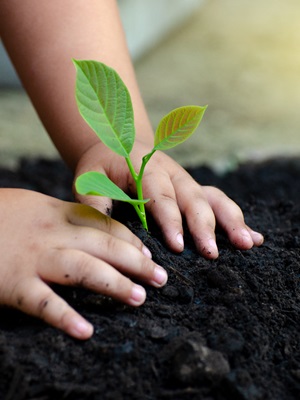Understanding the Global Food Waste Problem
Food waste is a significant global issue. Over one-third of all food produced worldwide is wasted, negatively impacting both the economy and the environment. Food waste is a major contributor to greenhouse gas emissions, exacerbating climate change. Despite this extensive waste, approximately 783 million people globally still face hunger, including 150 million malnourished children under five years old. According to Figure 1, addressing food waste is crucial for achieving Sustainable Development Goal 12.3, which aims to halve per capita food waste by 2030, making it essential for countries like Indonesia to actively participate.
Figure 1. Food Loss and Food Waste Index (Source: FAO, 2024)
Food Waste Challenges in Indonesia
The problem of food waste continues to occur in Indonesia. When some people have difficulty finding food to survive, others actually throw away their food. Sadly, food waste has become one of the environmental issues voiced in Indonesia, but the people seem silent about this fact. Hundreds of trillions of food waste are actually wasted, even though this amount could be used to feed more than 30% of Indonesia's population.
According to the Food and Agriculture Organization (FAO), around ¾ of the food produced for consumption ends up being lost or wasted. In Indonesia, food waste contributed the largest contribution in 2023, according to the Ministry of Environment and Forestry, totaling 41.4%, much higher than plastic waste which was 18.6%.
Indeed, food waste has also emerged as a significant issue in Indonesia, reflecting broader global challenges that significantly impact food security, environmental sustainability, and economic efficiency. In a 2021 Bappenas study report, the generation of Food Loss and Waste (FLW) in Indonesia from 146 food commodities between 2000 and 2019 ranged from 23 to 48 million tons per year, equivalent to 115 to 184 kg per capita per year. (BAPPENAS, 2021; Purwanto et al., 2023). This very large amount is related to systemic inefficiencies in the food supply chain in Indonesia, from production to consumption, and poses environmental, social, and economic challenges. To understand food waste, it is necessary to understand the definition of food waste in the food production to consumption chain as Figure 2.

Figure 2. The visualization between Food Loss and Food Waste (Source: Daniel et al., 2023)
By definition, Food Loss is a decrease in the quantity of food resulting from the decisions and actions of food suppliers in the food supply chain, which does not include retailers, food service providers, and consumers. Meanwhile, Food Waste is a decrease in the quantity of food resulting from the decisions and actions of retailers, food services, and consumers.
According to the United Nations report titled Think Eat Save which is part of the Food Waste Index Report 2024, Indonesia is the country with the largest food waste in the Southeast Asia region. The amount reaches 14.73 million tons per year.
Figure 3. Household food waste in Southeast Asia (Source: Goodstats, 2024)
Based on Figure 3, Indonesia is estimated to produce 14.73 million tons of household food waste per year, with a medium level of confidence. This amount is much higher than Vietnam, which is in second place, which is recorded to produce 7.08 million tons of household food waste per year. Indonesia itself is projected to produce 53 kilograms of household food waste per capita per year. This amount is the lowest in Southeast Asia. After Vietnam, Thailand is in third place, producing 6.18 million tons of household food waste per year. On the other hand, when viewed from the amount of food waste per capita, Laos is the highest, with a total of 89 kg of household food waste per capita per year.
Food waste has become a global crisis that must be suppressed immediately. The food crisis that occurs in various parts of the world should be able to be resolved if food waste can be minimized. The total waste from food waste can actually be used to support other people who are more in need. The magnitude of food waste is also felt in provinces in Indonesia, including West Java. Regional Secretary of West Java Province Herman Suryatman highlighted the large amount of food waste produced by the province's residents, especially seen from the waste generated at TPA Sarimukti.
"Of the 3,000 m3 or 1,500 tons of waste per day that (is dumped) to Sarimukti from 4 regencies/cities in Greater Bandung, half, 50% of it is food waste," he said.
Food waste not only worsens the food crisis, but also contributes to global warming. Food waste that is thrown away cannot be processed because it contains substances that are harmful to the environment. Food waste, especially that caused by excessive serving and the culture of leaving food or left over, must be eliminated immediately. Several countries do encourage leaving unfinished food, which ends up in landfills. Good management must be implemented so that excess food is not produced and wasted.
Reducing food waste must start with yourself. The mindset that always wants to buy food excessively must be eliminated. Living in sufficiency, especially related to food, does not mean being stingy. That means, they are aware that the food they buy is what they can and will finish, so that nothing ends up in the trash. Food waste ultimately stems from personal commitment. Throwing away food is not the answer, solutions to food waste are already widely available in front of our eyes. With a strong desire, everyone can help reduce food waste by buying enough food and setting aside excess food.
The Solution to Reduce Food Waste in Indonesia
Enhanced Public Awareness and Education
Nationwide campaigns emphasizing responsible consumption, proper portion control, effective food storage, and the environmental impacts of food waste.
School programs integrating food waste education into curriculums.
Improvement of Infrastructure and Technology
Investment in facilities capable of processing organic waste into valuable products such as compost and biogas.
Introduction of modern refrigeration and storage solutions to reduce spoilage at commercial and household levels.
Policy and Regulatory Measures
Mandates requiring supermarkets and hospitality businesses to donate surplus edible food to charitable organizations.
Incentives for businesses actively engaging in waste reduction practices, such as tax reductions or subsidies.
Development of Redistribution and Donation Networks
Establishment of efficient channels connecting surplus food producers with social organizations serving vulnerable communities.
Creation of digital platforms and mobile applications to streamline food redistribution and encourage public participation.
Collaboration Among Stakeholders
Facilitate partnerships between government bodies, private sector entities, and community-based organizations to implement cohesive waste management strategies.
Organize forums and workshops to share best practices and promote collaborative problem-solving approaches.
By implementing these detailed solutions, Indonesia can significantly reduce food waste, thereby improving environmental sustainability, enhancing economic efficiency, and promoting social well-being.
Posted 21/03/2025

















